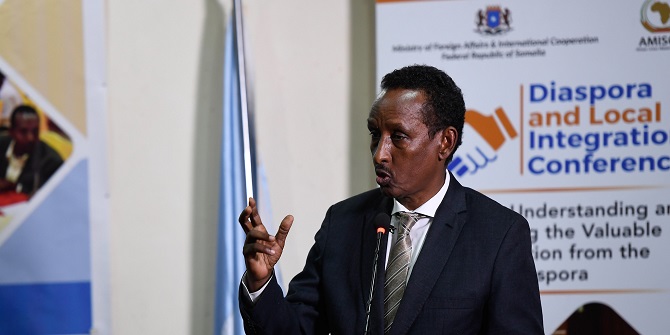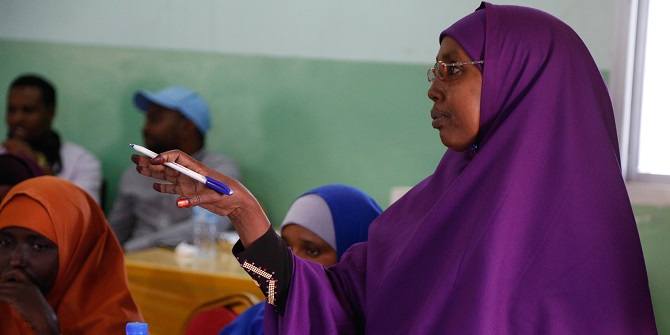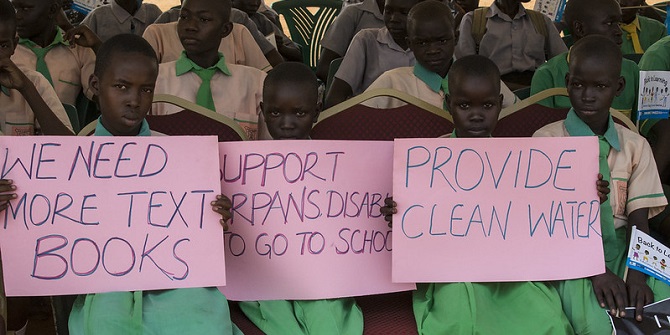Migrant and diaspora populations through their local and transnational connections have been recognised for some time as intimately implicated in processes of global transformation. In conflict settings, such populations, through their transnational engagement have been positioned as belligerents as well as being instrumental to peace. The social theorist Nina Glick Schiller frames such transmigrants as a social force ‘reshaping the workings of legal domains in more than one state’ (2005: 48).1
Transnationally active populations act in part through their remittances, however these flows which are typically connoted with money – financial remittances – can also consist of ideas, behaviours and identities – social remittances. The Somali-speaking regions of the Horn of Africa and the widespread Somali diaspora are very much part of such processes, highly connected between the global and the local.
In my forthcoming paper, ‘Transborder citizenship and activism: political engagement and resistance in the Somali environment’,2 I explore the agency of two individual actors (both Somali men), drawing upon their life histories. The aim of the paper has been to explore the notion of ‘civicness’ within the Conflict Research Programme, where civicness refers to the ‘meanings and practices that sustain integrity, trust, civility, inclusion and dialogue, and non-violence’ (Kaldor, 2018).3 Pockets of civicness are found in all of our country contexts. I argue that the quality of social remittances embodied and expressed by these two actors is consistent with or representative of the notion of civicness.
Both actors, referred to as Ahmed and Abdullahi, have been part of the mobility and displacement common across the region; Ahmed moved from the Somali Region of Ethiopia to Somalia due to the Ethiopia-Somalia war and then, later, just prior to the collapse of the state, to the UK. Abdullahi was displaced within Somalia during the civil war, moving to and within Gedo region for many years, then to Mandera across the border and finally to Nairobi, from where he is based.
The initiatives that they have separately been involved in have included the development of a mosque in the UK, promoting inclusion of different identity groups in charities and NGOs, working with peace committees in Kenya, promoting information and dialogue in Somali Region, Ethiopia, contributions to human rights bodies to raise awareness of abuses, and attempting to mediate in political crises.
Neither is part of any specific activist ‘issue’ or movement, nor do they consider themselves ‘activists’ in the common-sense use of the phrase. Instead, they express their beliefs through a variety of actions that challenge injustices and abuses of power, or to mitigate against the possibility or worsening of violence, or to promote inclusion of different identity groups in different fora. They have successes and failures; in the violent, turbulent contexts in which they engage, there are in fact many failures. However, for them, the act of trying is important. To not try is the failure.
This perspective, generated through life histories, brings attention to the idea of citizenship and transnational citizenship in particular. The policy world has responded to the globalised order and the multiple affiliations of people through the issuing, for example, of dual passports. However, citizenship, as well as its legal-bureaucratic aspect has social and cultural dimensions; the two juxtaposed as state-centric versus society-centric perspectives. The latter is concerned with forms of political membership and participation; it is with this in mind that Ahmed and Abdullahi can be described as transborder citizens expressing their beliefs, ideas and values in a range of arenas, sometimes utilising internationally supported platforms or organisation but equally in their own capacities as members of Somali society, influencing others from their bases outside of Somalia but also through direct contact within the country.
[1] Glick Schiller, N. (2005). Transborder citizenship: an outcome of legal pluralism within transnational social fields. In F. v. Benda-Beckmann, K. v. Benda-Beckmann, & A. Griffiths (Eds.), Mobile people, mobile law: expanding legal relations in a contracting world (pp. 27-49). Aldershot: Ashgate.
[2] The paper is current under review as part of a special edition compilation by the CRP.
[3] See: https://blogs.lse.ac.uk/crp/2019/05/22/kaldor-civicness/
Note: The CRP blogs gives the views of the author, not the position of the Conflict Research Programme, the London School of Economics and Political Science, or the UK Government.





